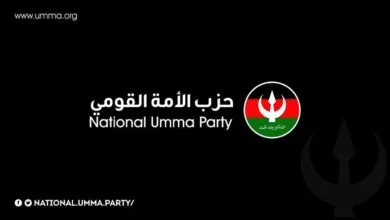The National Umma’s Differences…The Party’s Unity is no more

Sudan Events – Report
Once again, the situation within the National Umma Party exploded, a war of statements erupted within the party, and disputes entered the stage of challenging the legality and legitimacy of decisions, putting the historic party in the brink of division.
Internal disputes
The data war that broke out within the Umma Party recently brings internal disputes to the public with official statements, each of which claims legitimacy and legality.
A meeting of the presidential institution was announced, led by the party’s Vice President. Mohammad Abdullah Al-Douma expressed his rejection of the party’s participation in the meetings of the Civil Democratic Forces the coordination “Taqadum.”
The meeting of the Presidency institution, consisting of 13 members, formed a quorum, according to a statement issued that criticized the method of selecting the party’s representatives participating in the founding conference of “Taqadum” as it was done without the knowledge of the Presidency Institution, the Coordination Council, and the party’s institutions in the states.
The response of the designated party leader was: Fadlallah Barma Nasser said that the Al-Douma meeting was illegal because it took place without the presence or assignment of the president, and that the National Umma Party is adhering to its alliance in “Taqadum” and is committed to attending the founding conference.
State of fragmentation
The presidency institution consists of the party’s president, his deputies, and his assistants. It is one of the party’s long-established institutions, as it assigned Burma Nasser to head the party following the passing away of its leader, Imam Sadiq Al-Mahdi.
Burma Nasser said, according to “Sudan Tribune,” that what is happening in the party is one of the outcomes of the war that left a state of widespread fragmentation and division in the country. Burma adheres to the party’s positions in support of peace, considering that the disputes that are occurring now in the party will not reach the stage of division.
Burma said that “Taqadum” fully responded to the reform memorandum submitted by the party.
Maryam Al-Sadiq Al-Mahdi refused to comment to “Sudan Tribune” about the differences in positions within the party.
Siding with the militia
But this is not the first time that conflicting evidence has emerged from the party institutions. In March, the assistant to the head of the Umma Party announced; Rabah Al-Sadiq disavowed the party’s decisions.
Rabah said in a statement posted on her Facebook page that the party’s official page refused to publish a statement issued by the Coordination Council to respond to some inquiries about the participation of party members in the civil administration formed by the Rapid Support militia in Gezira State.
Rabah implicitly accused the party of siding with the Rapid Support Militia by turning a blind eye to its widespread violations, noting that these positions stain the history of the Umma Party.
But the Secretary General of the party; Al-Wathiq Al-Barir responded with a statement in which he said that the rapporteur of the Coordination Council has no legitimacy to issue statements in the name of the Coordination Council because it is not authorized to do so and its mission is only to coordinate meetings and internal arrangements.
Opposing decisions
A group within the Umma Party, which called itself the “Institutional Reform Group,” is active in opposing the decisions of the president and the party’s Secretary-General, but the party has always disavowed them.
Last April, 13 party heads in the states accused the party’s leadership of backing and aiding the Rapid Support Militia. The statement issued by the “13” called on the masses to hold the leadership accountable, and demanded an urgent exit from “Taqadum,” hinting at bypassing the current leadership.
The party’s presidency and general secretariat constantly face accusations from within the party’s membership of bias toward rapid support.



